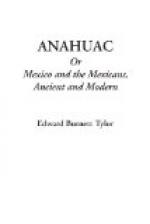I should not have said so much of our friend the Padre, were it not that I think there is a moral to be got out of him. I believe he may be taken as a type, not indeed of Roman Catholic missionaries in general, but of a certain class among them, who are of considerable importance in the missionary world, though there are not many of them. Taking the Padre as a sample of his class, as I think we may—judging from the accounts of them we meet with in books, it is curious to notice, how the point in which their system is strongest is just that in which the Protestant system is weakest, that is, in social training and deportment. What a number of men go to India with the best intentions, and set to work at once, flinging their doctrines at the natives before they have learnt in the least to understand what the said natives’ minds are like, or how they work,—dropping at once upon their pet prejudices, mortally offending them as a preliminary step towards arguing with them; and in short, stroking the cat of society backwards in the most conscientious manner. By the time they have accomplished this satisfactory result, a man like our Cuban Padre, though he may have argued but little and preached even less, would have a hundred natives bound to him by strong personal attachment, and ready to accept anything from him in the way of teaching.
We paid a regular round of visits to the Floridan settlers, and were delighted with their pleasant simple ways. It is not much more than thirty years since they left Florida, and many of the children born since have learnt to speak English. The patches of cultivated land round their cottages produce, with but little labour, enough vegetables for their subsistence, and to sell, procuring clothing and such luxuries as they care for. They seemed to live happily among themselves, and to govern their little colony after the manner of the Patriarchs.
Whether any social condition can be better for the black inhabitants of the West Indies, than that of these settlers, I very much doubt. They are not a hard-working people, it is true; but hard work in the climate of the tropics is unnatural, and can only be brought about by unnatural means. That they are not sunk in utter laziness one can see by their neat cottages and trim gardens. Their state does not correspond with the idea of prosperity of the political economist, who would have them work hard to produce sugar, rum, and tobacco, that they might earn money to spend in crockery and Manchester goods; but it is suited to the race and to the climate. If we measure prosperity by the enjoyment of life, their condition is an enviable one.
I think no unprejudiced observer can visit the West Indies without seeing the absurdity of expecting the free blacks to work like slaves, as though any inducement but the strongest necessity would ever bring it about. There are only two causes which can possibly make the blacks industrious, in our sense of the word,—slavery, or a population so crowded as to make labour necessary to supply their wants.




